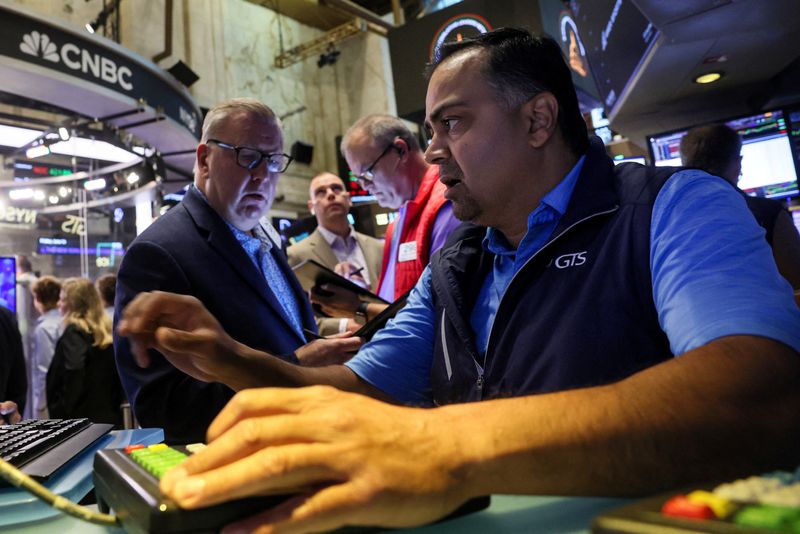[ad_1]
By Amanda Cooper
LONDON (Reuters) -Global stocks hit record highs on Wednesday, driven by a rally in tech shares that has made AI chipmaker Nvidia (NASDAQ:) the world’s most valuable company, while the dollar stalled as soft U.S. retail sales data suggested rates could fall this year.

MSCI’s All-World index was up 0.15% at 805.12, having traded at an all-time high of 805.43.
A burst higher in U.S. tech stocks on Tuesday allowed Nvidia to dethrone Microsoft (NASDAQ:), which boosted shares in chipmakers in Asia overnight.
U.S. stock index futures also rose, with those on the tech-heavy up 0.23% and those on the up 0.1%. In Europe, the fell 0.1%.
The pound rose after data earlier showed British inflation returned to the Bank of England’s 2% target in May for the first time since 2021.
The fall in inflation will be welcomed by both Prime Minister Rishi Sunak and the BoE – but likely has come too late either to turn around Sunak’s fortunes at next month’s election or to prompt a rate cut from the central bank on Thursday.
„With UK inflation at 2% and inflation in the U.S. – if you take PCE – at 2.7%, this is hardly disruptive,” Lombard Odier economist Samy Chaar said, referring to the Federal Reserve’s preferred inflation measure the Personal Consumption Expenditures index.
„It gives credibility to the idea that the Bank of England act in August at the latest and then that should be followed by the Fed in September,” he said.
Sterling, which is down around 0.2% so far this month, last traded at $1.2728, up 0.15%, while the euro rose 0.1% to $1.0747, but was still down 1% in June.
The single currency has been under pressure since French President Emmanuel Macron called a snap election last week after his ruling centrist party was trounced by the far right in the European Parliament elections.
U.S. markets were closed on Wednesday, which kept overall market volatility subdued.
RATE CUT HOPES
Data on Tuesday showed U.S. retail sales barely rose in May and figures for the prior month were revised considerably lower, suggesting economic activity remained lacklustre in the second quarter.
The numbers led to a small boost in rate-cut expectations for September, with traders pricing in a 67% chance of easing compared with a 61% chance a day earlier, the CME FedWatch tool showed. Markets are pricing in 48 basis points of cuts this year.
„(The) Fed will need more data to support its case for a rate cut and investors should not overact to one or two data points,” said Vasu Menon, managing director of investment strategy at OCBC.
Last week, mild U.S. inflation readings contrasted with an overall hawkish stance by Fed officials, who trimmed their previous median projection for three quarter-point rate cuts this year to one.
„Rate cuts are a stronger story for 2025 but that’s fine because there is hope that it will happen in a bigger way over the next two years even if 2024 remains uncertain, and that will keep markets supported,” Menon said.
Fed officials are looking for further confirmation that inflation is cooling and for any warning signs from a still-strong labour market as they steer cautiously toward what most expect to be a rate cut or two by the end of this year.
The , which measures the performance of the U.S. currency against six others, held steady at 105.19.
The Japanese yen drifted, leaving the dollar mostly unchanged at 157.92, near last week’s six-week highs.
The yen has lost a third of its value against the dollar in the last 4-1/2 years, mostly due to the wide gap between interest rates in Japan and those in the United States.

Minutes of Bank of Japan’s April policy meeting showed policymakers debated the impact a weak yen could have on prices, with some flagging the chance of raising interest rates sooner than expected if inflation overshoots.
In commodities, oil prices rose, with futures up 0.6% at $85.80 a barrel, while futures gained 0.48% to trade at $81.96.
[ad_2]
Source link

